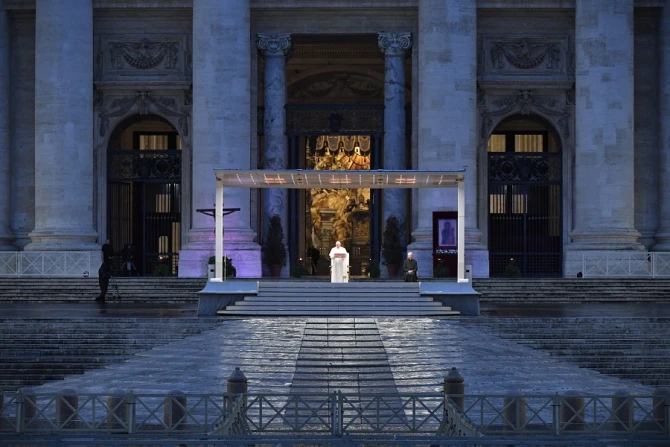
Vatican Media
On a rain-soaked evening in March 2020, as the world grappled with an invisible enemy that had brought nations to their knees, an extraordinary moment of unity and hope unfolded in the heart of Rome. Pope Francis, a solitary figure in white against the vast emptiness of a gloomy, rainy St. Peter’s Square, delivered a message that would resonate across continents, transcend religious boundaries, and touch the hearts of millions.
The special Urbi et Orbi blessing—”to the city and to the world”—came at a time when the global community was desperately seeking solace. Streets were deserted, hospitals overwhelmed, and fear and uncertainty had brought the whole world to a standstill. In this dark hour, the Pope’s words offered a lifeline to a world adrift in uncertainty.
A Poignant Scene of Solitude and Strength
As twilight descended on the Vatican, the usually bustling crowds were conspicuously absent. The expansive square, typically alive with the chatter of pilgrims and tourists, stood eerily silent. The steady patter of rain on ancient cobblestones provided a somber backdrop to the unfolding scene.
Before the Pope stood two powerful symbols of faith: the ancient icon of Mary Salus Populi Romani—usually hosted at the Roman Basilica of St. Mary Major—and the miraculous crucifix from the church of San Marcello.
Having survived a fire that destroyed the church in 1519, during an epidemic of the plague in 1522, the crucifix of San Marcello was carried in a procession through the city. According to popular belief, the procession caused the plague to leave the neighborhoods through which the crucifix passed, and eventually to die out in Rome.
These revered artifacts, brought to St. Peter Square at the Pope’s request, witnesses to centuries of human struggle and triumph, seemed to stand as silent guardians of hope in this modern crisis.
The image of the Pope, small against the grand façade of St. Peter’s Basilica, walking alone to the top of the square, was a visual metaphor for the isolation many were feeling. Yet, in that solitude, there was an unmistakable aura of strength and determination.
Words That Echoed Across a Troubled World
A solitary Pope Francis began his meditation with words that struck a chord with millions: “For weeks now it has been evening.” In this simple phrase, he captured the sense of prolonged darkness that had enveloped the world. His voice, broadcast to homes and hearts across the globe, trembled with emotion as he spoke of the fear and loss gripping humanity.
Drawing on the Gospel of Mark, the Pope likened the pandemic to a furious squall threatening to “sink our boat” of humanity. “We have realized that we are on the same boat, all of us fragile and disoriented,” he said, his words a balm to those feeling isolated and afraid.
As he spoke, viewers from around the world reported feeling a profound sense of connection. In living rooms from New York to New Delhi, in poor Brazilian “favelas” and high-rises alike, people of all faiths—and none—found themselves moved by the universal message of hope and solidarity.
A Call to Awaken Our Faith and Humanity
The Pope’s message was not just one of comfort but also a rallying cry for humanity to rediscover its best self. He spoke of this crisis as a time to choose “what matters and what passes away, a time to separate what is necessary from what is not.”
His praise for those on the frontlines—doctors, nurses, supermarket employees, cleaners, caregivers, transport workers, and countless others—brought tears to the eyes of many. These “ordinary people—often forgotten people,” as the Pope called them, were elevated as examples of the power of the human spirit.
A Moment of Profound Silence
As the Pope concluded his address, he knelt before the Blessed Sacrament. The silence that fell over St. Peter’s Square in that moment seemed to extend to the furthest corners of the Earth. For a brief, powerful instant, the world seemed to pause, united in reflection and prayer.
The blessing that followed—the Urbi et Orbi—carried with it the weight of centuries of tradition and the immediacy of present need. As the Pope raised the monstrance, blessing the city and the world, many reported feeling a wave of peace wash over them, a moment of tranquility in the eye of the storm.
Hope Rekindled
As the ceremony concluded, the rain continued to fall on the empty square. But for millions watching around the world, a spark of hope had been ignited. Social media platforms lit up with messages of gratitude and renewed faith. People of diverse backgrounds shared how the Pope’s words had touched them, reminding us all of our shared humanity.
In the days that followed, countless stories emerged of people inspired to acts of kindness and solidarity. The Pope’s call to create “new forms of hospitality, fraternity, and solidarity” seemed to awaken a dormant sense of community in many.
This historic Urbi et Orbi blessing will be remembered as not just a religious event, but also a moment when humanity, faced with its own fragility, found strength in unity and hope.
As the world continued to navigate the challenges of the pandemic and its aftermath, the memory of that rainy evening in Rome serves as a powerful reminder of our capacity for resilience, compassion, and hope in the face of adversity.
